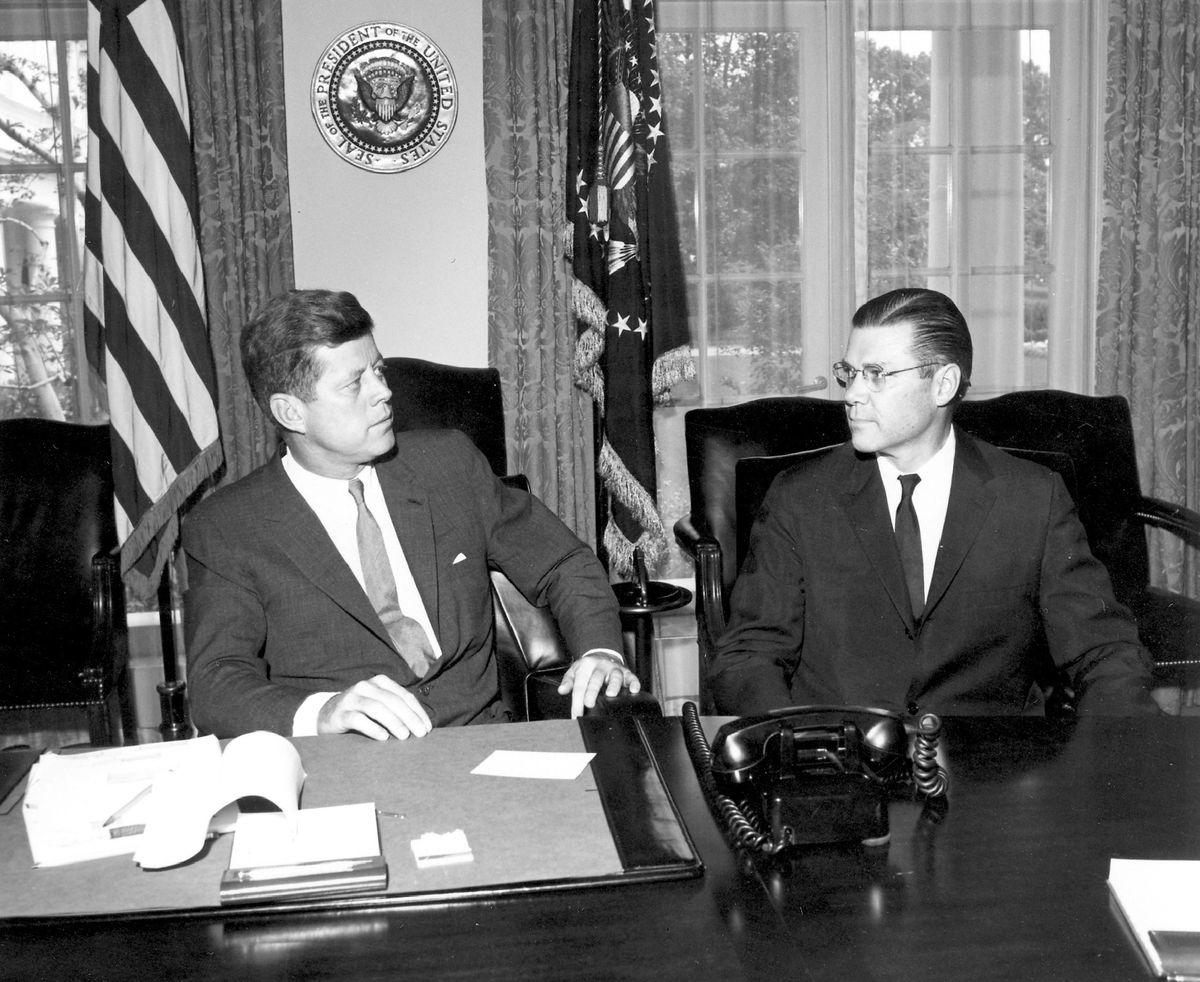McNamara, Vietnam War architect, dies
Kennedy’s defense chief was target of protests

WASHINGTON – Robert S. McNamara, the Kennedy-Johnson-era defense secretary, will be most remembered as a man instrumental in sending hundreds of thousands of Americans to fight in Vietnam, and who was haunted by his decision for the rest of his life.
McNamara, who died Monday at his Washington home at age 93, became one of the favorite targets of protesters as the war, launched as part of the nation’s ongoing effort to stop communist aggression, tore apart the United States in the 1960s.
“He became emblematic of what that war was about, both the hope and the disappointment that set in,” presidential historian Robert Dallek said.
McNamara, a San Francisco native, had come to Washington in 1961 to run the Defense Department for the Kennedy administration. After World War II he had gone to work at the Ford Motor Co., where the “whiz kid” rose quickly through the ranks, a rare influential outsider in that family-run firm.
Just a year older than the 43-year-old president, McNamara was to be a symbol of the Kennedy administration’s youth and vigor, and someone who would apply his modern, analytical management techniques to the Pentagon.
The two men also shared a view that “flexible responses” to world crises were preferable to threatening massive retaliation, through limited wars if necessary. Despite resistance from the Pentagon ranks, McNamara went about trying to change U.S. military culture to better prepare the armed forces for such conflicts.
One of the first “flexible responses” was the failed 1961 Bay of Pigs invasion of Cuba, an effort that McNamara said 40 years later was “dumb.”
His reputation as an executive remained intact, however, and today even critics laud his efforts to revamp the Defense Department and contain the Soviet threat during the Kennedy years.
“There is a place for analytical rigor in Pentagon policy, and he knew how to answer all the small questions,” said Ivan Eland, the director of the Center on Peace & Liberty, which studies national defense issues.
“But,” Eland said, “he couldn’t answer the big questions.”
Sometimes he could, historians said, however. In October 1962, McNamara was one of the major players in the Cuban missile crisis. Soviet nuclear missiles had been spotted in Cuba, and the United States reacted forcefully, imposing a naval quarantine. Some in Kennedy’s Cabinet and in the military urged an even stronger response.
McNamara came to be convinced that a blockade, rather than a military strike, was the proper strategy, however.
“He was not buying the military arguments about the urgency of the threat,” said Chris Preble, the director of foreign policy studies at Washington’s Cato Institute, a libertarian research group.
Kennedy reportedly relied on McNamara to convince military officials that airstrikes would start a war that might not be stopped easily, and the president would say that he was lucky to have McNamara and his cool, logical approach at the Pentagon.
The United States and the Soviet Union seemed to be at the edge of nuclear war, but Moscow backed down when the United States agreed that it wouldn’t invade Cuba. A few months later, the U.S. quietly dismantled nuclear missiles in Turkey and Italy.
The big question of Vietnam, though, would prove thornier, and ultimately would preoccupy McNamara.
He, like others of the “best and brightest” who ran the Kennedy and Johnson administrations, thought that by backing the South Vietnamese, the United States could control communist aggression.
U.S. involvement in Vietnam began to escalate after the 1964 Gulf of Tonkin incident, when North Vietnamese patrol boats reportedly fired on U.S. destroyers. As the Viet Cong and its allies stepped up their efforts to control the south, Johnson escalated a campaign of aerial bombing of North Vietnam and poured troops into the region; by the end of 1967, half a million Americans were serving there.
McNamara’s cool public demeanor was now a liability.
“He was the target. He was one of the whiz kids, and people now thought he was responsible for Vietnam policy,” said Darrell West, the director of governance studies at Washington’s Brookings Institution, a centrist public-policy research center.
Protesters dubbed it “McNamara’s war,” even though the secretary was privately becoming wary of the strategy as early as 1965. He ordered a detailed review of the war – which in 1971 became public as the Pentagon Papers – and in February 1968 he stepped down to become the president of the World Bank, a position that he held until 1981.
McNamara stayed largely out of public sight for years, but in the last years of his life he became an outspoken critic of his own policy.
His public doubts began to surface in the mid-1990s, when he wrote his memoir, “In Retrospect: The Tragedy and Lessons of Vietnam.”
“We were wrong,” McNamara said in 1995 of the principles that underlay the Vietnam involvement. “We were terribly wrong.”
His agony reached a new generation eight years later in a 2003 documentary, “The Fog of War: Eleven Lessons From the Life of Robert S. McNamara,” which was released several months after the United States invaded Iraq.
“I’m very proud of my accomplishments,” he said in the film, “and I’m very sorry that in the process of accomplishing things I’ve made errors.”
His agonized soul, though, couldn’t heal his reputation.
As West put it Monday, the McNamara reflections “do not change the loss of lives.”
Vietnam was too bloody and too defining an event for a generation that’s now in middle age to brush aside, he and others said.
“He will be remembered as an exceptional public servant,” Dallek said, who tried to make the Pentagon more efficient and had what many regard as a distinguished career at the World Bank.
However, Dallek said, “in between was Vietnam, and that overshadowed everything else he did during and after his public service.”